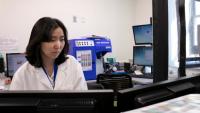Research

Our work has defined key mechanisms controlling HSC function in normal, stressed, leukemic, and aging conditions, and provided clinically relevant insights into the pathogenesis of myeloid malignancies. Our current research takes advantage of these findings to perform innovative investigations of hematopoiesis and HSC biology in mouse models to develop new strategies to treat human diseases.
Manipulating Emergency Myelopoiesis Pathways to Treat Blood Deregulations
Blood production is a highly regulated process that tailors the output of the myeloid and lymphoid lineages based on hematopoietic demands and the needs of the organism. While the overall structure of the blood system and its hierarchical nature is well established, many questions still remain regarding the mechanisms controlling self-renewal activity and quiescent status of HSCs, and the lineage specifications that occur in non-self-renewing multipotent progenitors (MPP). Our investigations of emergency myelopoiesis pathways have provided new insights into the mechanisms of HSC activation and lineage commitment, and showed that a shift from glycolysis to mitochondrial metabolism changes the epigenetic landscape of activated HSCs and drives lineage poising. They also uncovered new regulatory mechanisms by showing that environmental factors produced by the bone marrow (BM) niche dictate the production of various lineage-biased multipotent progenitors and control the local expansion and differentiation of committed progenitor cells. These mechanisms normally tailor blood production to the need of the organism, but are hijacked in malignancies. Our goal is to explore the role of these mechanisms in various deregulated contexts, and to manipulate them for the treatment of blood malignancies and immune deregulations.
Fighting Blood Aging by Preventing HSC Decline
The blood system is essential for organismal health and to maintain the body's ability to fight infections. HSCs self-renew and maintain blood production for life and, as such, are one of the few blood cells that truly age or initiate malignancies. While HSCs efficiently produce all mature blood cells in young individuals, they often fail with age leading to degraded blood production characterized by anemia, immunosenescence, blood cancers, and clonal hematopoiesis, which is a new contributing factor to systemic age-related organ dysfunction. Paradoxically, although HSCs numerically expand with age, their functional activity declines over time, resulting in impaired engraftment and decreased blood regeneration capacity. Our recent work on aged HSCs has identified novel molecular hallmarks of an old state, and provided unique insights into the mechanisms of stem cell aging. In particular, it showed that replication stress as a potent driver of functional exhaustion of aged HSCs, and demonstrated that defective activation of autophagy allowed the accumulation of metabolically overactivated and dysfunctional old HSCs. Our goal is to extend these investigations to develop novel rejuvenation interventions for healthier aging, which include restoring the elderly's ability to fight infections and to combat the development of blood cancers.